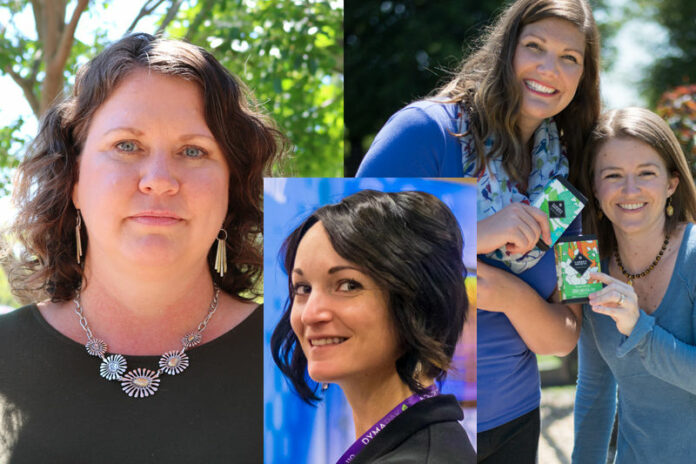Women in cannabis are educators, leaders, business owners
The women involved in the cannabis industry have built an infrastructure of support around them.
From the now disbanded Sonoma County Women Grow chapter to the Women’s Cannabis Business Development (WCBD) to WEmpowered, the cannabis industry in Sonoma County has a strong female backbone.
“I think it’s really exciting, because it’s a new industry, there’s not that glass ceiling, there’s not that good ol’ boys club,” said Shannon Hattan, co-founder and CEO of Fiddler’s Greens and co-founder of WCBD. “We’re able to define this industry the way we want to right now and, if you can get through the regulations and if you can find the money, there’s really no limit to what people can do in this industry.”
Many of the women who are involved in the local cannabis industry have used this as an opportunity to develop their businesses and to promote educational pathways for those who may be interested in cannabis.
“There’s been more opportunity for women to come out, there’s less gender bias because it’s a new industry (and) there’s also a lot of media that helps promote women in the industry,” said Erin Gore, founder and president of The Garden Society and co-founder of WEmpowered.
Gore along with Karli Warner, who does marketing and communication for The Garden Society, started The Garden Society in an effort to produce products that are geared more toward women. Both Gore and Warner were drawn to cannabis because of stressors in their lives; they wanted to create products and host educational sessions for people who may be dealing with similar issues.
“We realized that there weren’t products for women out there … we really found this need and this void,” said Gore. “We (set out to) try to provide education and products for women to find another tool for their wellness tool chest.”
In the past, The Garden Society has also hosted in-home parties for women to educate them on cannabis use. The parties don’t involve the company’s products, but serve as a way of educating those who may not have been comfortable with cannabis use in the past.
Talking to prospective consumers isn’t the only way women are getting involved in education. Active groups like WCBD host educational events for business owners, growers and the canni-curious of all genders — even if their names suggest otherwise.
“We do a lot of education around regulation and policy. We have attorneys who work in the cannabis industry that come and speak,” said Nancy Birnbaum, executive director of WCBD. “With some help I’d like to see us do bigger events, take advantage of online (technology) and do webinars.”
According to Hattan, WCBD is a networking and social group for those who are in the industry or thinking about joining the industry. In the past, their talks and informational sessions have centered around health, legislature and business cultivation.
While the events have a strong female presence, Birnbaum noted that men make up 30 to 40 percent of their regular informational session attendees.
For female entrepreneurs in the business, WEmpowered provides a resource for women to network and stay educated about issues prevalent to their business. “We really work together as peers to raise each other up and be successful, to make sure our businesses thrive in this community,” noted Gore. “This community specifically for women has been really instrumental in propelling our success.”
According to Stacy Bryant, founder of People Need People, a full-service cannabis staffing company that has branches throughout Sonoma, Mendocino and Humboldt counties, the cannabis industry has a “significant amount of women operating in a leadership role.”
At People Need People, the majority of the staff is female. “We really have a strong female presence,” said Bryant. “It’s a nurturing environment that’s inviting.”
When asked about the role that women play in the industry, Bryant, Gore and Hattan all noted that the strong presence of women has created a more nurturing and collaborative environment.
“Without being too stereotypical,” said Hattan. “The guys were in the field, the guys were farming and coming out of an era of prohibition and being careful … so the wives, the girlfriends, the partners have been the ones who have been like ‘I’m going to go to the city council meeting, I’m going to go to the board of supervisors meeting,’ so that need has arisen for us to be able to collaborate and share information and try to get through this together.”
While the collaborative environment has provided a platform for education and networking between business owners and consumers alike, there are still problems facing business owners in the industry.
According to Gore, one hiccup that female entrepreneurs may face is getting funding. “We’re trying to fundraise as female entrepreneurs … when you look at who’s getting funded in the cannabis space, we’re an anomaly right now and I hope we can propel that change.”
Other challenges that business owners who are involved in the creation of cannabis products face include stigma and packaging regulation, amongst other things. “Whether it’s the difficulty to bank or acceptance on social media — there’s a very heavy stigma,” said Gore. “It’s federally illegal, so there’s a lot of challenges that come with that.”
According to Bryant, whose business focuses more on the relationships between the people who are working with the plants, the biggest challenge involves, “managing the expectations of the employees as well as the client to work toward a more conventional work environment.”
“Right now the industry is very much in an infantile state,” noted Bryant. “It’s messy, unknown, exciting … it’s been great getting to participate.”









